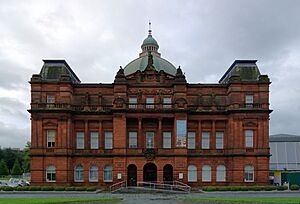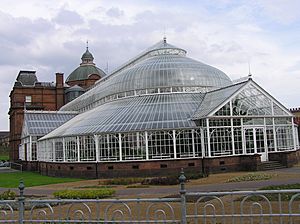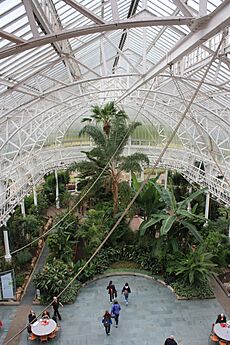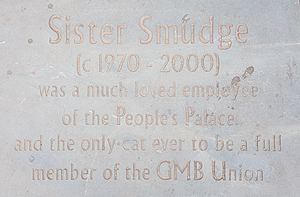People's Palace, Glasgow facts for kids
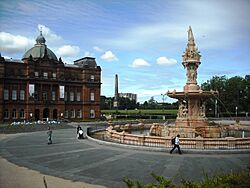
People's Palace on Glasgow Green
|
|
| Established | 1898 |
|---|---|
| Location | Glasgow Green, Glasgow, G40 1AT, Scotland |
| Visitors | 223,774 (2019) |
The People's Palace and Winter Gardens is a cool museum and a big glass building in Glasgow, Scotland. It's located in a park called Glasgow Green. A long time ago, on January 22, 1898, a person named The 5th Earl of Rosebery officially opened it.
Contents
A Place for Everyone
The idea behind the People's Palace was to create "palaces for the people." This idea came from writers like John Ruskin and William Morris. The Glasgow People's Palace was inspired by a similar place in London.
Back then, the East End of Glasgow was a very busy and crowded part of the city. The People's Palace was built to be a fun and educational place for everyone. It was designed by the City Engineer, Alexander B. McDonald. Sculptures by William Kellock Brown decorated it, showing things like Art, Science, and Industry.
When it opened, Lord Rosebery called it "A palace of pleasure and imagination." He said it was a place where people could feel at home and make memories. He also declared the building "Open to the people for ever and ever."
What You Can See Inside
When the People's Palace first opened, the ground floor had rooms for reading and relaxing. The first floor was a museum, and the top floor was an art gallery.
Since the 1940s, it has been Glasgow's main museum for social history. It tells the story of the city and its people from 1750 until today. The exhibits show how Glasgow has changed and what life was like for people living there.
You can see what a "single end" looked like. This was a one-room home in a tenement building. There are also displays about going to "the steamie," which was a public laundry. You can learn about nights out at "the dancing" in places like the famous Barrowland Ballroom. There are also stories about trips "doon the watter" (down the Firth of Clyde) on steamers like the Waverley. You can also find the campaign desk of a famous Scottish Socialist, John MacLean, on the first floor.
Restoration and Reopening
In the 1990s, the building closed for almost two years for important repair work. It reopened in 1998, exactly 100 years after it first opened. A special plaque near the entrance tells this story. The Winter Gardens, the big glasshouse at the back, were also fixed up. The glass was replaced, and the gardens were tidied.
In January 2019, both the People's Palace and Winter Gardens closed again. This was because the building was not safe. Rare plants from the Winter Gardens had to be moved to new homes.
The People's Palace museum section reopened in June 2019. It had £350,000 worth of updates, including moving the fire exits. The museum then closed again in March 2020 because of the pandemic. It reopened for two days a week in June 2021.
The Winter Gardens stayed closed because the material holding the glass in place was old and needed to be replaced. Fixing it was going to cost a lot of money, between £5 million and £7.5 million. Many venues in Glasgow faced problems because of lost money during the pandemic.
In January 2024, good news arrived! The National Lottery Heritage Fund gave money for the repairs. An initial £850,000 was received, and more money, up to £7.5 million, was expected later. The total cost of the project was estimated to be £35.9 million.
The People's Palace closed on April 14, 2024, for a big refurbishment and restoration. It is expected to reopen in 2027, after three years. The Winter Gardens will also return, after being closed since December 2018.
Special Art and a Giant Fountain
As part of the restoration, an artist named Ken Currie created a series of paintings for the museum's ceiling dome. These eight paintings celebrate the 200th anniversary of the Calton weavers Massacre of 1787. They show the history of Glasgow's workers from that time to today.
In 2005, a huge fountain called The Doulton Fountain was repaired and moved to its current spot in front of the museum. It is 46 feet tall and 70 feet wide at its base. It is the largest terracotta fountain in the world! Sir Henry Doulton gave it to the city in 1888 to celebrate Queen Victoria’s Golden Jubilee. It has a figure of the Queen and groups representing different parts of the British Empire.
The People's Palace Cat
In the 1980s, a cat named Smudge became famous in Glasgow. She even became a member of a trade union called the General, Municipal, Boilermakers and Allied Trade Union. This happened after another union, NALGO, wouldn't let her join because she was considered a "blue collar worker."
 | Kyle Baker |
 | Joseph Yoakum |
 | Laura Wheeler Waring |
 | Henry Ossawa Tanner |


